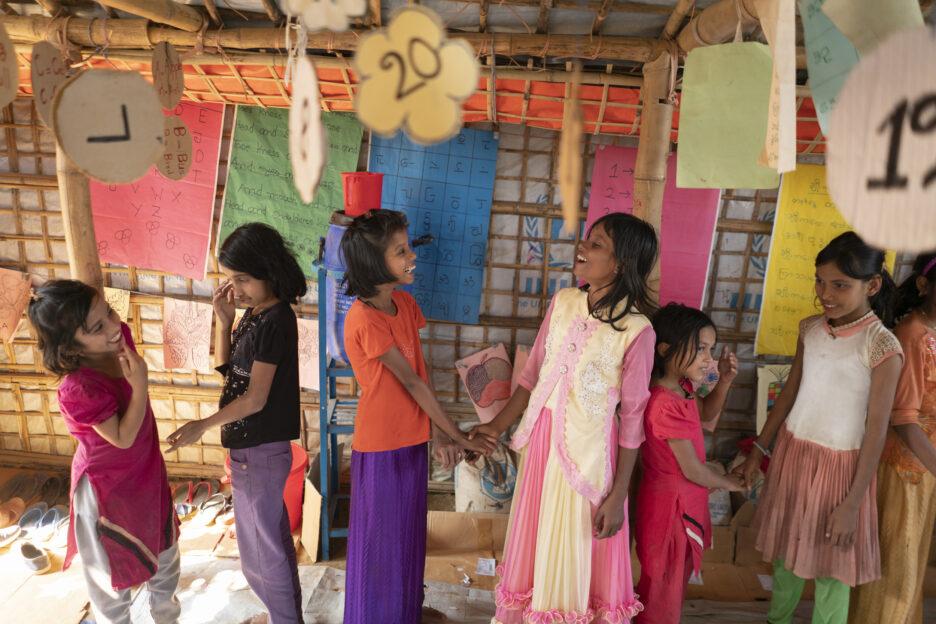CASE FOR INVESTMENT: U.S. GOVERNMENT SUPPORT TO EDUCATION CANNOT WAIT
>> Please click here for a PDF version of this text.
Education Cannot Wait (ECW), the UN’s global fund for education in emergencies and protracted crises, will host a High-Level Financing Conference from February 16-17, 2023 in Geneva – co-convened with the governments of Colombia, Germany, Niger, Norway, South Sudan, and Switzerland – to mobilize $1.5 billion in support of its 2023-2026 Strategic Plan.
With an intended pledge of at least $158 million over four years, the U.S. Government can commit to financing quality, inclusive, and transformative education for over 222 million children and adolescents living in crisis and conflict settings around the world.
ECW’S IMPACT
Education is a fundamental right for every child, yet the number of children whose education is affected by crisis has increased significantly. New estimates show that 222 million crisis-affected children and adolescents are missing a quality education that would shape and determine their futures. They need urgent educational support.
ECW is at the forefront of efforts to bridge this gap by advocating for access to education in crisis settings and has mobilized a diverse cadre of donors to support critical programs that help crisis-affected children and adolescents access quality education and achieve better learning outcomes. Since its inception in 2016, ECW has:
-
- Reached 6.9 million children and adolescents with programs and interventions in some of the world’s most challenging humanitarian contexts
- Provided education materials and textbooks to over 4.2 million children
- Strengthened equity and gender equality by reaching 3.3 million girls
- Supported the training of 87,367 teachers and administrators
- Doubled the number of teachers trained on mental health and psycho-social support
- Developed 24 Multi-Year Resilience Programs and disbursed 199 First Emergency Response grants
U.S. GOVERNMENT SUPPORT FOR ECW
The U.S. Government has been central to the success of ECW, as the third largest donor to ECW currently, and its support will be critical if ECW is to meet its 2023-2026 Strategic Plan goals. A February 2023 pledge by the United States of at least $158 million over four years will deliver a message that the U.S. will continue to support and lead others in addressing the gap in access to education for the 222 million children affected by crisis.
| Fiscal Year | Recommended Funding Level |
| FY22 | The U.S. Government has announced $7 million of the $25 million congressionally appropriated in funding to ECW for FY22. The U.S. Government should announce the remaining $18 million of the $25 million already appropriated, in addition to the recommended pledge levels below. |
| FY23 | $35 million ($30 million was included in the final FY23 Omnibus for ECW but $35 million was preliminarily approved by the House and Senate) |
| FY24* | $35 million |
| FY25* | $35 million |
| FY26* | $35 million *At least $35 million per year should be allocated to ECW. |
| Total | The U.S. Government should announce a total multi-year pledge of $158 million in February 2023 in support of the Education Cannot Wait High-Level Financing Conference. |
RECOMMENDATIONS FOR U.S. GOVERNMENT
-
- Champion investments for education in crisis and conflict settings by making an intended pledge of at least $158 million over four years at the High-Level Financing Conference.
- Urge other public and private sector donors to make ambitious pledges at the High-Level Financing Conference.
- Maintain at least $30 million in State & Foreign Operations Appropriations funding for Education Cannot Wait and consider an increase to $50 million per year in FY24 and beyond to meet the global need.
- Continue to engage constructively with the ECW Secretariat by serving in leadership roles and providing expertise and oversight.
- Support all levels of access to education in crisis and conflict settings including early childhood development, pre-primary, foundational learning, primary, secondary, and post-secondary education and for traditionally marginalized groups including girls, children and youth with disabilities, and minority groups.
- Integrate education in all U.S. Government humanitarian response efforts – both bilateral and multilateral – and continue to promote coordination across all sectors and branches of the U.S. Government.

